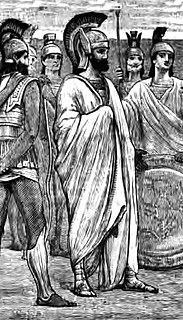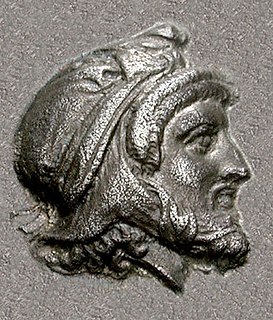Related Research Articles

Agesilaus II, was a king (basileus) of the ancient Greek city-state of Sparta and a member of the Eurypontid dynasty ruling from 398 to about 360 BC usually, in Plutarch's words, "as good as though commander and king of all Greece" and was for the whole of it greatly identified with his country's deeds and fortunes. Small in stature and lame from birth, Agesilaus became ruler somewhat unexpectedly in his mid-forties. His reign saw successful military incursions into various states in Asia Minor, as well as successes in the Corinthian War, but several diplomatic decisions resulted in Sparta becoming increasingly isolated prior to his death at the age of 84 in Cyrenaica.

Lysander was a Spartan admiral who commanded the Spartan fleet in the Hellespont which defeated the Athenians at Aegospotami in 405 BC. The following year, he was able to force the Athenians to capitulate, bringing the Peloponnesian War to an end. He then played a key role in Sparta's domination of Greece for the next decade until his death at the Battle of Haliartus.

Acarnania is a region of west-central Greece that lies along the Ionian Sea, west of Aetolia, with the Achelous River for a boundary, and north of the gulf of Calydon, which is the entrance to the Gulf of Corinth. Today it forms the western part of the regional unit of Aetolia-Acarnania. The capital and principal city in ancient times was Stratos. The north side of Acarnania of the Corinthian Gulf was considered part of the region of Epirus.

Tissaphernes was a Persian soldier and statesman, Satrap of Lydia. His life is mostly known from the magistral works of Thucydides and Xenophon. According to Ctesias, he was the son of Hidarnes III and therefore the great grandson of Hydarnes, one of the six conspirators who had supported the rise of Darius the Great.

Epaminondas was a Greek general (strategos/Boeotarch) of Thebes and statesman of the 4th century BC who transformed the Ancient Greek city-state of Thebes, leading it out of Spartan subjugation into a pre-eminent position in Greek politics called the Theban Hegemony. In the process he broke Spartan military power with his victory at Leuctra and liberated the Messenian helots, a group of Peloponnesian Greeks who had been enslaved under Spartan rule for some 230 years after being defeated in the Messenian War ending in 600 BC. Epaminondas reshaped the political map of Greece, fragmented old alliances, created new ones, and supervised the construction of entire cities. He was also militarily influential and invented and implemented several major battlefield tactics.

Artaxerxes II Mnemon was the King of Kings of the Achaemenid Empire from 404 BC until his death in 358 BC. He was a son of Darius II and Parysatis.
The polis of Sparta was the greatest military land power of classical Greek antiquity. During the classical period, Sparta governed, dominated or influenced the entire Peloponnese. Additionally, the defeat of the Athenians and the Delian League in the Peloponnesian War in 431-404 BC resulted in a short-lived Spartan dominance of the southern Greek world from 404 to 371 BC. Due to their mistrust of others, Spartans discouraged the creation of records about their internal affairs. The only histories of Sparta are from the writings of Xenophon, Thucydides, Herodotus and Plutarch, none of whom were Spartans. Plutarch was writing several centuries after the period of Spartan hegemony had ceased. This creates difficulties in understanding the Spartan political system, which was distinctly different from any other Greek polis.

Pharnabazus II was a Persian soldier and statesman, and Satrap of Hellespontine Phrygia. He was the son of Pharnaces II of Phrygia and grandson of Pharnabazus I, and great-grandson of Artabazus I. He and his male ancestors, forming the Pharnacid dynasty, had governed the satrapy of Hellespontine Phrygia from its headquarters at Dascylium since 478 BC. He married Apama, daughter of Artaxerxes II of Persia, and their son Artabazus was likewise a satrap of Phrygia. His grand-daughter Barsine married Alexander the Great.

The Sacred Band of Thebes was a troop of select soldiers, consisting of 150 pairs of male lovers which formed the elite force of the Theban army in the 4th century BC, ending Spartan domination. Its predominance began with its crucial role in the Battle of Leuctra in 371 BC. It was annihilated by Philip II of Macedon in the Battle of Chaeronea in 338 BC.
Agis II was the 18th Eurypontid king of Sparta, the eldest son of Archidamus II by his first wife, and half-brother of Agesilaus II. He ruled with his Agiad co-monarch Pausanias.

The Corinthian War was an ancient Greek conflict lasting from 395 BC until 387 BC, pitting Sparta against a coalition of Thebes, Athens, Corinth and Argos, backed by the Achaemenid Empire. The immediate cause of the war was a local conflict in northwest Greece in which Thebes and Sparta intervened. The deeper cause was hostility towards Sparta, provoked by that city's "expansionism in Asia Minor, central and northern Greece and even the west". The Corinthian War followed the Peloponnesian War, in which Sparta had achieved hegemony over Athens and its allies.

The Battle of Coronea in 394 BC, also Battle of Coroneia, was a battle in the Corinthian War, in which the Spartans and their allies under King Agesilaus II defeated a force of Thebans and Argives that was attempting to block their march back into the Peloponnese.
Agesipolis I was the twenty-first of the kings of the Agiad dynasty in ancient Sparta.
Cleombrotus I was a Spartan king of the Agiad line, reigning from 380 BC until 371 BC. Little is known of Cleombrotus' early life. Son of Pausanias, he became king of Sparta after the death of his brother Agesipolis I in 380 BC, and led the allied Spartan-Peloponnesian army against the Thebans under Epaminondas in the Battle of Leuctra. His death and the utter defeat of his army led to the end of Spartan dominance in ancient Greece. Cleombrotus was succeeded by his son Agesipolis II. His other son was Cleomenes II.
Agis III was the eldest son of Archidamus III, and the 21st Eurypontid king of Sparta.

Agis IV, the elder son of Eudamidas II, was the 25th king of the Eurypontid dynasty of Sparta. Posterity has reckoned him an idealistic but impractical monarch.

The Battle of Haliartus was fought in 395 BC between Sparta and Thebes. The Thebans defeated a Spartan force attempting to seize the town of Haliartus, killing the Spartan leader Lysander. The battle marked the start of the Corinthian War, which continued until 387 BC.
Sphodrias was a Spartan general during the period of Greek history known as the Spartan hegemony. In 379 BC, he was in command of a garrison in the Spartan-occupied city of Thespiae in Boeotia. Aiming to increase Spartan power in the region, he attempted to march by night to seize the Piraeus, the port of Athens. He miscalculated the length of the march, however, and when the sun rose he and his army were caught out in the middle of the Thyrian plain, still some miles from the Piraeus. He retreated back to Boeotia.

Classical Greece was a period of around 200 years in Greek culture. This Classical period saw the annexation of much of modern-day Greece by the Persian Empire and its subsequent independence. Classical Greece had a powerful influence on the Roman Empire and on the foundations of Western civilization. Much of modern Western politics, artistic thought, scientific thought, theatre, literature and philosophy derives from this period of Greek history.

The Theban–Spartan War of 378–362 BC was a series of military conflicts fought between Sparta and Thebes for hegemony over Greece.
References
-
 This article incorporates text from a publication now in the public domain : Smith, William, ed. (1870). Dictionary of Greek and Roman Biography and Mythology .Missing or empty
This article incorporates text from a publication now in the public domain : Smith, William, ed. (1870). Dictionary of Greek and Roman Biography and Mythology .Missing or empty |title=(help)